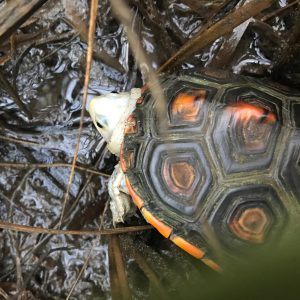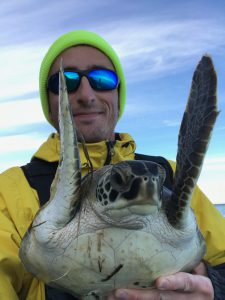Dan Catizone is a new SNRE MS student, studying diamondback terrapins in the St. Joseph Bay and Florida panhandle. He also works with sea turtles in the same region, for USGS. He is advised by Dr. Christina Romagosa.
Work
When did you know you wanted to work in ecology? Do you have an origin story?
I really don’t. I always had an interest in wildlife, and my family encouraged it. I expected to work in this field, as far back as I can remember, so there’s no specific moment where I said, “Oh, I really want to do this.”
I did change my focus some. At first, I thought I wanted to work with mammals, but during my time in undergrad, I realized I actually wanted to work with reptiles, specifically turtles and tortoises. Then from there, I got into sea turtles.
What’s one word that describes how you work?
Somewhat chaotic. I try to keep it simple, but things happen. It’s never simple, but always fun.
I tell people that, when you go out in the field, you’re going to have a lot of fun, and you have to keep a good sense of humor, because something will go wrong. Nothing dangerous, no one gets hurt, and I always laugh by the end.
Do you have a go-to tool?
Hands. Hands are probably the best tool I could ever have. We have to jump on sea turtles, and I lift things to look for terrapins, so I would say having working appendages is great.
What’s your favorite organism you’ve studied and why?
Probably the diamondback terrapins I’m studying now. I’ve mostly done sea and pond turtle work. I’ve done a little work outside of that with frogs. Diamondback terrapins are interesting because they have such a wide range. I grew up learning about them, even though I lived up north. I remember people talking about them way back then, and now I’m all the way in Florida and I actually have the opportunity to work with them, and to learn more about them.

They’re unique, because they live in brackish water, and are the size of small pond turtles. There’s no other species like that, at least in North America.
I’m excited to figure out their mysteries.
If you’d asked me this question about a year ago, I probably would have chosen sea turtles, because I’d never seen a full adult sea turtle until I came down here. I saw my first one out night-tagging. I stopped when I saw it, and had to be called back to reality, I was so stunned. They’re MASSIVE.
What’s an unexpected experience you’ve had because of your work?
It’s funny, but I didn’t know that you can get a flat tire from a fish.
We drive vehicles on the beach for our sea turtle night work. Two years ago, we had to use one of our work trucks. We were driving along, and all of the sudden, we got a flat tire. I couldn’t figure out why, until I looked under the tier. There, staring back at me, was a catfish, with one of its barbs straight through the tire!

I sat there for a full minute, just thinking about how I had just gotten a flat tire from a fish.
I then had to drive about three miles off the beach, at about five miles per hour, with a flat tire.
Lifestyle
How do you manage your time?
Not well. Everything gets done, but the process to get there is usually all over the place. I’ve been trying to get better about being organized, and making schedules, and picking times. Almost 100% of the things I do don’t go as planned, BUT they almost always wind up being better than what I was expecting.
Why?
I feel it’s better just to do something than to plan it out. Recently I went on a road trip, and we didn’t plan where we were sleeping until we got to each place, and we wound up finding more interesting places because of it.
With school, I do my best work under pressure. I like to work on things a week in advance.

How do you balance work with your personal life?
June and July is basically all night work, so we’re going from sunset to sunrise. You really don’t have a social life because you’re sleeping while everybody’s awake, and awake when everyone is sleeping. You get a few chances to sneak out if the timing is right. It’s a matter of balance, just like with everything. If you see an opportunity to socialize, take it. If I have a chance to be social outside of work, especially when fieldwork is really heavy, I take it, because I don’t know when the next one is going to be.
What do you like about living in Gainesville?
It’s more about what I remember from being up north. I went from New Jersey, which is the most densely populated state, to Rhode Island, which is the second most populated state, to Port St. Joe, Florida, which has like two traffic lights. It’s a small town. You might not know everybody, but you do recognize everybody in the store. It’s definitely nice, but kind of a culture shock. Coming back to Gainesville, it’s “Oh, there are traffic lights, and traffic, and people.” I could see someone’s face, and probably never see that person again. So I think, “Ok, I can adjust back to this.”
Have you got any wildlife jokes?
Well, I have funny questions people have asked me.
During our nesting work, while the female turtles were on the beach nesting, a woman asked how we knew if the turtle was male or female, after we had just explained that the turtles were on the beach to lay their eggs.
I have trouble hiding when I want to laugh, so my boss quickly sent me away to check on the turtles while she spoke to the lady.
Another time, someone asked one of our interns if turtles could breathe air, which is a valid question from the public, but then the intern turned to another intern and asked them!
It’s a valid question if you don’t know anything about sea turtles. They live in the ocean, and you might not know, but if you’re working with them, you probably shouldn’t have to ask.
What are you currently reading?

A Sand County Almanac! Although I have less time for reading now that the semester is starting.

One day, I’ll try to read the Origin of Species. That’s a life goal. I have it, I just have to get to it.
In Closing
If you could call yourself back when you started undergrad, what advice would you give?
Get more field experiences, and maybe do a little bit better grade-wise in freshman and sophomore years. I wish I had gotten a little bit more field experience as an undergrad; half of my internships were lab-based. I’ve gotten plenty now though, and this advice is with the benefit of hindsight. I tried a little bit of everything, but now that I know what I like, I would just cut to the chase and do fieldwork.
That said, I loved all the experiences that I had. Maybe not doing one of the lab internships would have effected where I am now.
Who else would you like to see answer these questions?
Colin Goodman.

Is there anything else you’d like to tell people?
Help turtles cross the road, and carry them in the direction they were already going.
Also, if you’re on a beach in Florida, turn off your lights at night.

~
This interview by Rhett Barker, and lightly edited for clarity by Rhett Barker and Claire Williams.
Thanks to Dan Catizone for sitting down with us.
Click here to learn more about the UF WEC department.
The concept for this interview is based on an interview series by the University of Washington called How UW Works, which is in turn based on a series called How I Workby LifeHacker magazine.
 0
0
